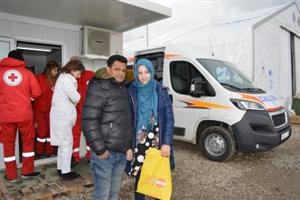
TABANOVCE, the former Yugoslav Republic of Macedonia – On a bleak, cold day in late February, hundreds of refugees, bundled in winter coats and carrying bulging bags and baskets, stream into the Tebanovce transit centre, stationed on the border between the former Yugoslav Republic of Macedonia and Serbia. Most have been travelling for months, and will likely only rest here for a few hours before hoisting there bags back up to move again – on into camps in Serbia and other neighboring countries
Each day, an average of 2,500 refugees enter the former Yugoslav Republic of Macedonia, the majority fleeing conflicts in Afghanistan, Syria and Iraq – and the hectic scene in Tabanovce has become a daily routine.
But today there is a notable difference. It is the first day that UNFPA’s new mobile clinic will be providing women in the transit centre with much-needed sexual and reproductive health services

